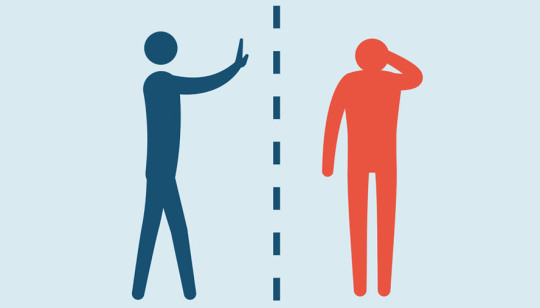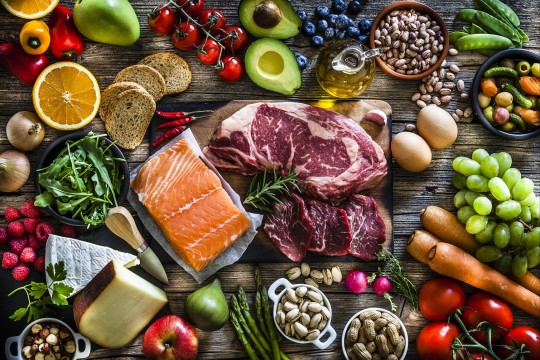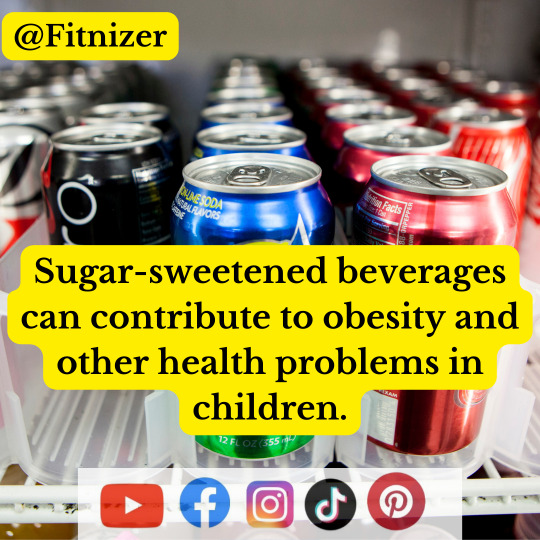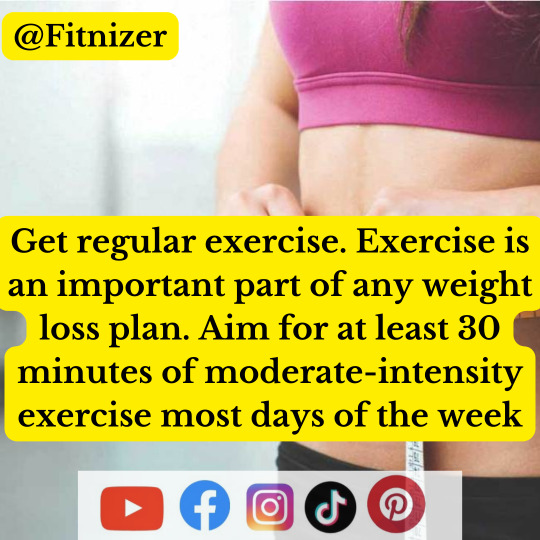Hi there! As a Health and Fitness I'm passionate about sharing my knowledge and helping others achieve their wellness goals.
Don't wanna be here? Send us removal request.
Text

Weight Loss Tips
#lose weight fast#i wanna be weightless#i wanna lose weight#weight loss diet#i want to be weightless#weight loss#low cal diet
0 notes
Text

Obesity Save With Diet And Exercise
1 note
·
View note
Text
Eating a balanced diet is important for overall health. This means eating plenty of fruits, vegetables, whole grains, and lean protein
#fitness#health#fitmotivation#fitspo#fitbody#tw ed diet#low cal diet#weight loss diet#dieta motylkowa
0 notes
Text
Managing stress is important for mental and physical health. There are many different ways to manage stress, such as exercise, relaxation techniques, and spending time with loved ones.
0 notes
Text
Seeing your doctor for regular checkups is important for early detection and prevention of disease. Adults should have a physical exam and bloodwork every year
1 note
·
View note
Text
Maintain a healthy weight. Being overweight or obese increases your risk for many chronic diseases
1 note
·
View note
Text
Limit alcohol intake. Drinking too much alcohol can damage your liver, heart, and other organs
0 notes
Text
Get vaccinated. Vaccines can help protect you from serious diseases, such as measles, mumps, and rubella.
0 notes
Text
What are the best ways to prevent colds and flu?
There is no sure way to prevent colds and flu, but there are things you can do to reduce your risk of getting sick. Here are some tips:

Wash your hands often. This is the single most important thing you can do to prevent the spread of germs. Wash your hands with soap and water for at least 20 seconds, especially after using the bathroom, before eating, and after being around someone who is sick.

Avoid close contact with people who are sick. If you can, try to avoid close contact with people who are sick. If you do come into contact with someone who is sick, wash your hands immediately.

Get a flu vaccine every year. The flu vaccine is the best way to protect yourself from the flu. The flu vaccine is not 100% effective, but it can help reduce your risk of getting sick and developing serious complications.

Eat a healthy diet. Eating a healthy diet can help keep your immune system strong. Make sure to eat plenty of fruits, vegetables, and whole grains.

Get enough sleep. When you're sleep-deprived, your immune system is not as strong. Aim for 7-8 hours of sleep each night.

Manage stress. Stress can weaken your immune system. Find healthy ways to manage stress, such as exercise, yoga, or meditation.

If you do get sick, there are things you can do to help yourself feel better. These include:
Drink plenty of fluids. This will help to keep you hydrated and prevent dehydration.

Get plenty of rest. Your body needs time to heal, so it's important to get plenty of rest.

Take over-the-counter medications. Over-the-counter medications, such as ibuprofen or acetaminophen, can help to relieve symptoms such as fever, aches, and pains.

See a doctor if your symptoms are severe. If your symptoms are severe or do not improve after a few days, see a doctor.
By following these tips, you can help reduce your risk of getting sick and stay healthy throughout the year.
1 note
·
View note
Text
How can I manage my stress levels?
Stress is a normal part of life, but too much stress can have negative consequences for your physical and mental health. Here are some tips on how to manage your stress levels:

* **Identify your stressors.** The first step to managing stress is to identify the things that are causing you stress. Once you know what your stressors are, you can start to develop strategies for dealing with them.

* **Take breaks.** When you're feeling stressed, it's important to take breaks throughout the day. Get up and move around, or step outside for some fresh air. Taking a few minutes to relax can help you clear your head and come back to your work or activities feeling refreshed.

* **Exercise regularly.** Exercise is a great way to relieve stress. It releases endorphins, which have mood-boosting effects. Aim for at least 30 minutes of moderate-intensity exercise most days of the week.

* **Get enough sleep.** When you're sleep-deprived, you're more likely to feel stressed. Aim for 7-8 hours of sleep each night.

* **Practice relaxation techniques.** There are many different relaxation techniques that can help you manage stress, such as deep breathing, meditation, and yoga. Find a technique that works for you and practice it regularly.

* **Spend time with loved ones.** Social support can be a great way to relieve stress. Spend time with friends and family who make you feel good.

* **Do things you enjoy.** When you're feeling stressed, it's important to do things that you enjoy. This could be anything from reading a book to taking a walk in nature. Taking some time for yourself to relax and de-stress can help you feel better.

* **Seek professional help.** If you're struggling to manage your stress on your own, don't hesitate to seek professional help. A therapist can teach you coping skills and help you develop a stress management plan.

Managing stress is an important part of maintaining your overall health and well-being. By following these tips, you can learn to manage your stress levels and live a happier and healthier life.
0 notes
Text
Nutritional Strategies for Healthy Weight Gain

Gaining weight in a healthy way can be challenging, but it is possible with the right nutritional strategies and exercise plan.
Here are a few tips:
**Eat more calories.** This may seem obvious, but it is important to eat more calories than you burn in order to gain weight. A good starting point is to add 500 calories to your daily intake. You can do this by adding healthy snacks throughout the day, eating larger portions of meals, or choosing higher-calorie foods.
**Focus on protein and healthy fats.** Protein and healthy fats are essential for building and repairing muscle tissue, which can help you gain weight in a healthy way. Good sources of protein include meat, poultry, fish, eggs, beans, and lentils. Good sources of healthy fats include avocados, nuts, seeds, and olive oil.
**Eat plenty of fruits and vegetables.** Fruits and vegetables are packed with vitamins, minerals, and antioxidants that are essential for good health. They are also relatively low in calories, so you can eat plenty of them without going over your calorie goal.
**Drink plenty of water.** Water is essential for proper hydration and can help you feel full. It is also calorie-free, so you can drink as much as you want without affecting your calorie intake.
**Get regular exercise.** Exercise can help you build muscle and burn calories. However, it is important to not overdo it, as this can lead to weight loss. Aim for 30 minutes of moderate-intensity exercise most days of the week.
**Here are some additional tips for healthy weight gain:**
* **Eat regular meals and snacks throughout the day.** This will help keep your metabolism revved up and prevent you from getting too hungry.
* **Choose nutrient-dense foods.** This means foods that are high in calories and nutrients. Some examples of nutrient-dense foods include fruits, vegetables, whole grains, lean protein, and dairy products.
* **Add calorie-dense foods to your meals and snacks.** This could include things like nuts, seeds, avocado, dried fruit, and full-fat dairy products.
* **Drink calorie-rich beverages.** This could include things like milk, smoothies, and juice.
* **Strength train.** Strength training helps to build muscle, which can help you gain weight in a healthy way. Aim for 2-3 strength training sessions per week.
* **Get enough sleep.** Sleep is essential for muscle growth and repair. Aim for 7-8 hours of sleep per night.
By following these tips, you can gain weight in a healthy and sustainable way.
It is important to note that you should not try to gain weight too quickly. Aim to gain 1-2 pounds per week. If you gain weight too quickly, you may be gaining fat instead of muscle.
If you are struggling to gain weight, it is important to talk to your doctor. They can help you create a safe and effective weight gain plan based on your individual needs.
0 notes
Text
How to Lose Weight Through Exercise

Exercise is an important part of any weight loss plan. It helps you burn calories, build muscle, and improve your overall health.
Here are some tips on how to lose weight through exercise:
* **Choose a variety of exercises.** To get the most benefit from exercise, you should choose a variety of activities that work different muscle groups. Some examples of weight loss exercises include brisk walking, running, swimming, biking, and strength training.
* **Set realistic goals.** Don't try to do too much too soon. Start with a goal of working out for 30 minutes 3-4 times per week. As you get stronger, you can gradually increase the intensity and duration of your workouts.
* **Find an activity you enjoy.** If you don't enjoy an exercise, you're less likely to stick with it. Find an activity that you find challenging but also enjoyable.
* **Listen to your body.** If you're feeling pain, stop exercising immediately. Don't push yourself too hard.
In addition to exercise, it is also important to eat a healthy diet and get enough sleep. By following these tips, you can lose weight and improve your overall health.
Here are some additional tips for losing weight through exercise:
* **Warm up before you exercise.** This will help to prevent injuries.
* **Cool down after you exercise.** This will help your body to recover.
* **Drink plenty of water.** Staying hydrated is important for overall health and for weight loss.
* **Get enough sleep.** Sleep is essential for muscle growth and repair.
If you are new to exercise, it is important to start slowly and gradually increase the intensity and duration of your workouts. It is also important to talk to your doctor before starting any new exercise program, especially if you have any health conditions.
0 notes
Text

Sugar Sweetened Can Is Harmful For Your Children
0 notes
Text

Get Regular Exercise
0 notes
Text
How can I control my hunger?

There are many ways to control hunger naturally. Here are a few tips:
* **Eat protein-rich foods.** Protein is a very filling nutrient, and it can help you feel full for longer periods of time. Good sources of protein include lean meat, poultry, fish, eggs, beans, and nuts.
* **Eat fiber-rich foods.** Fiber is another nutrient that can help you feel full. Good sources of fiber include fruits, vegetables, whole grains, and legumes.
* **Drink water.** Sometimes, hunger can be caused by dehydration. Drinking a glass of water can help to tell the difference between thirst and hunger.
* **Eat regular meals and snacks.** Skipping meals or snacks can make you feel more hungry later on. Instead, try to eat regular meals and snacks throughout the day.
* **Exercise regularly.** Exercise can help to reduce hunger hormones and increase feelings of fullness. Aim for at least 30 minutes of moderate-intensity exercise most days of the week.
* **Get enough sleep.** When you're sleep-deprived, your body produces more of the hunger hormone ghrelin. Getting enough sleep can help to regulate your appetite and reduce hunger.
* **Manage stress.** Stress can also lead to increased hunger. Find healthy ways to manage stress, such as exercise, yoga, or meditation.
If you're still struggling to control your hunger, talk to your doctor. There may be an underlying medical condition that's causing your hunger.
#fitness#fitness gym#health#workout#lose fat#viral video#fitmotivation#lose stomach weight#lose weight fast#weight loss#hungry
1 note
·
View note
Text
What types of foods should I eat to lose weight?

There are many different types of foods that can help you lose weight. Some of the best foods for weight loss include:
* Fruits and vegetables: Fruits and vegetables are low in calories and high in nutrients, making them a great choice for weight loss. They are also a good source of fiber, which can help you feel full and satisfied.
* Lean protein: Lean protein, such as chicken, fish, beans, and lentils, is a great way to build and maintain muscle mass. Muscle tissue burns more calories than fat tissue, so building muscle can help you lose weight and keep it off.
* Whole grains: Whole grains, such as brown rice, quinoa, and oats, are a good source of fiber and other nutrients. They can help you feel full and satisfied, and they can also help regulate blood sugar levels.
* Healthy fats: Healthy fats, such as those found in avocados, nuts, and seeds, can help you feel full and satisfied. They can also help improve your heart health and cognitive function.
* Low-fat dairy products: Low-fat dairy products, such as milk, yogurt, and cheese, are a good source of protein and calcium. They can also help you feel full and satisfied.
It is also important to limit your intake of processed foods, sugary drinks, and unhealthy fats. These foods can contribute to weight gain and other health problems.
Here is a sample meal plan that includes some of the best foods for weight loss:
* Breakfast: Oatmeal with berries and nuts
* Lunch: Salad with grilled chicken or fish
* Dinner: Salmon with roasted vegetables
* Snacks: Fruits, vegetables, nuts, seeds
This is just a sample meal plan, and you may need to adjust it based on your individual needs and preferences. It is important to talk to your doctor before starting any new diet or exercise program.
#fitness#fitness gym#health#workout#lose fat#viral video#fitmotivation#lose stomach weight#lose weight fast#weight loss#weight loss diet#i wanna be weightless#i want to be weightless#i wanna lose weight#i need to lose this weight
0 notes
Text
What is a healthy weight for me?
A healthy weight for you is the weight at which you have the lowest risk of developing chronic diseases such as heart disease, stroke, type 2 diabetes, and some types of cancer. There is no one-size-fits-all answer to this question, as what is considered a healthy weight can vary depending on factors such as your age, sex, race, and ethnicity.
One way to estimate your healthy weight is to use your body mass index (BMI). BMI is a measure of body fat based on your height and weight. A BMI of 18.5 to 24.9 is considered healthy, while a BMI of 25 or higher is considered overweight or obese. However, BMI is not perfect, and it can be inaccurate for people who are very muscular or have a lot of body fat.
Another way to estimate your healthy weight is to use waist circumference. Waist circumference is a measure of the amount of fat around your waist. A waist circumference of 35 inches or more for women and 40 inches or more for men is considered a risk factor for chronic diseases.
The best way to determine your healthy weight is to talk to your doctor. Your doctor can take into account your individual factors and recommend a healthy weight range for you.
Here are some general tips for losing weight and keeping it off:
* Eat a healthy diet. This means eating plenty of fruits, vegetables, and whole grains, and limiting processed foods, sugary drinks, and unhealthy fats.
* Exercise regularly. Aim for at least 30 minutes of moderate-intensity exercise most days of the week.
* Find healthy ways to manage stress. Stress can lead to unhealthy eating habits and weight gain. Find healthy ways to manage stress, such as exercise, yoga, or meditation.
* Be patient. Losing weight and keeping it off takes time and effort. Don't get discouraged if you don't see results immediately. Just keep at it, and you will eventually reach your goals.
#fitness#lose weight fast#lose fat#weight loss diet#weight loss#lose stomach weight#i wanna be weightless#i want to be weightless#gaining weight on purpose#i wanna lose weight
1 note
·
View note